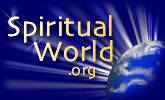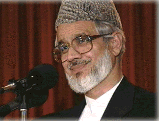
ISLAM
 Islam means "the way of commitment and submission to God. Islam is the name of our religion, and Muslim is the person who practices our religion," said
Dr. Muzammil Siddiqi, Director of the Islamic Society of Orange County in California.
Islam means "the way of commitment and submission to God. Islam is the name of our religion, and Muslim is the person who practices our religion," said
Dr. Muzammil Siddiqi, Director of the Islamic Society of Orange County in California.
A kind, soft-spoken man in his mid-forties, Dr. Siddiqi has dark hair, a moustache, and a generous beard with hints of gray whiskers. Spirit shines through his dark eyes.
He greeted me very cordially when we met in his small, simple office in Garden Grove. In his subdued tweed jacket and light shirt with the top button open, he seemed relaxed, truly happy.
While born in India, Dr. Siddiqi received his doctorate in comparative religions at Harvard University. He was happy to relate to me the Islamic tradition of higher consciousness and spirituality.
A Way of Peace and Perfection
We sat comfortably around his book-laden desk. I began my questions about higher levels of consciousness.
 Dr. Siddiqi readily understood. "Islam is a way of peace and perfection, and a Muslim is a person striving toward that way. A Muslim is working toward peace in the full sense of the word — not just absence of war — peace, meaning wholeness, completeness, being without any defect, without any inadequacy, being perfect, being full. A Muslim is not claiming that he is perfect, but he is striving, struggling within himself and with the society around him, to reach to that goal, to that aim that he has before himself. Islam is a continuous struggle, a continuous work."
Dr. Siddiqi readily understood. "Islam is a way of peace and perfection, and a Muslim is a person striving toward that way. A Muslim is working toward peace in the full sense of the word — not just absence of war — peace, meaning wholeness, completeness, being without any defect, without any inadequacy, being perfect, being full. A Muslim is not claiming that he is perfect, but he is striving, struggling within himself and with the society around him, to reach to that goal, to that aim that he has before himself. Islam is a continuous struggle, a continuous work."
Islamic Practices
"What is the way, or method, of Islam?" I asked.
"The way of Islam? Within Islam itself, every Muslim, every believer, has to practice certain worship, some personal practices, and five prayers every day. Every male and female is expected to perform prayers five times a day. Also, we fast during the month of Ramadan. Fasting is a very important, highly spiritual practice that you can go through, along with prayers and devotions at night during the month.
 "We also emphasize that each believer earns for himself, for his own livelihood, and that a believer should work hard. The believer, the Muslim, strives to live simply and humbly and do some charity to others. Charity and simplicity are important because they also purify greed from the heart, which comes from the mind."
"We also emphasize that each believer earns for himself, for his own livelihood, and that a believer should work hard. The believer, the Muslim, strives to live simply and humbly and do some charity to others. Charity and simplicity are important because they also purify greed from the heart, which comes from the mind."
Spiritual truth is indeed universal, I thought, as I briefly contemplated that most religions recommend charity and simplicity in order to make the heart pure.
The Virtues
"We emphasize trust in God, patience, and constancy," Dr. Siddiqi added.
"Please continue," I urged.
"As a result of the devoted life in frequent prayer, devotional activity, simplicity, charity to others, humility, patience, and constancy, the believer becomes more whole, more filled with peace, love, compassion and awareness. These virtues, as they become living attributes in each devotee, develop into a state of higher consciousness called fana."
I smiled in delight and fascination as we entered into the discussion of higher consciousness.
Committed Completely to God
He went on, "Always the highest thing that teachers and masters would work on in helping a believer is what is called a state of fana. Fana means that you totally forget yourself. You forget who you are. You feel that you are not doing an activity but rather that the action is being done through you.
"So," he underscored, "in all your activities, you commit yourself completely to God. You give yourself to God, and that’s what Islam means. Islam does not take its name from any person — as Christianity takes its name from Christ or Buddhism takes its name from Buddha — or Hinduism receives its name from the Indus River and Valley of India.
"You see," he leaned toward me, "the central basic point of Islam is consciousness of God."
Levels of Consciousness
"Do you pass through a number of levels to arrive at fana and greater consciousness of God?" I asked.
He nodded. "Your state changes from one level of consciousness to another. Through your spiritual work, through your practices, you try to attune with the next level, and as you develop, the next level becomes your station. Then you move to another higher station, and your consciousness grows and grows. As you grow you become an instrument of God, so you have no pride in yourself, no arrogance, no sense that ‘I am doing this.’ You forget this ‘I’ which is a deception," Dr. Siddiqi responded.
"But," he added with emphasis, "the scriptures and masters say that even at this stage, fana, a believer should not think too much about this negation of himself." Dr. Siddiqi cautioned, "At this level the ego, the I-sense, can feel that it is doing the job of self-negation and thus remain very strong in itself, very strong in its opinion that it is controlling the spiritual development. So, you have to negate the negation of yourself — truly humble yourself — and then comes the state of baqa, the preservation of the person.
Living in Consciousness of God
Fascinating, I thought, the Muslim strives to totally negate himself or herself before God, and then comes a truly humble state which reveals baqa, the preservation of the person.
"So," he waited for me to return from my thoughts, "the exalted state of fana, along with its marvelous sense of freedom, spiritual attunement, and well being is not the goal because it does not represent complete submission of oneself to God. Fana is a state leading to the highest state of baqa. When the believer is totally living under the presence of God, then one is preserved by God and lives under the consciousness of God. This is the highest state of knowledge: ma-rarifa. Ma-rarifa means knowledge, or highest consciousness. This state of baqa is not consciousness in any abstract sense. It is the consciousness of God."
Other Religions
"Ideally, then," I asked, "how does a Muslim view the world and other religions?"
"Islam is a very God-centered religion, so emphasis is always to recognize that everything that is here in this world God has brought into existence. A Muslim sees God in everything. We say, ‘See God in everything, don’t see yourself.’ Sometimes this has led to pantheistic ideas but really there is no pantheism in Islam and cannot be. We don’t point our fingers and think that, ‘This is God or that is God.’ Once you point at anything and say, ‘This is God,’ you are doing polytheism, which becomes idolatry.
Ultimate Cause
"So," he continued, "you cannot point to any person or any figure and say that he or it is God. God is always beyond. But whatever exists exists because of God, so God is present in everything. At the same time, nothing exists in this world without God. It is God who is the Cause of causes. It is God who is the Ultimate Cause, but God himself is transcendent. He is beyond. You cannot point to him, you cannot say that ‘Here is God’ because the moment you do that there is some danger of, a risk of, idolatry — taking some person, some being, some object, as divine. A Muslim wants to become an instrument of God and live under God’s consciousness, forgetting this ‘I’ which is a deception."
Relationship Between God and Man
I asked Dr. Siddiqi if, in this state of complete submission to God, there was any merging or sharing of the divine nature by the Creator and his beloved believer?
"God is God, man is man, but there is a very close relationship. There is no identity, no merging of the two, but there is a very deep closeness. The Prophet Mohammed was told by God, ‘Give the answer, tell them (the seekers) I am near.’ Now, God didn’t say how near. You cannot measure that closeness in inches or in feet or in yards. But God’s nearness is something that everyone has to realize for himself or herself. How very near God becomes to you. He is closer to you than your own jugular veins. He is closer to you than your own self. God is closer to me than my own self.
"So, God is near. But still, one should not point to any person and say, ‘This is God.’ This becomes idolatry, this becomes polytheism, and then people turn away from the worship of God to the worship of other things. Other things and other people.
"The Muslim surrenders his ego, his deceptive ego, and finds himself in the nearness of God. He finds that God is nearer than his own jugular vein, nearer than his own self."
Spiritual Struggle
Dr. Siddiqi then asked me, "Have you heard the word jihad in today’s media, especially newscasts, where the term is translated as ‘holy war?"’
"Yes, I’ve heard the term Islamic Jihad — ’holy war’ — many times and have wondered deeply about what Muslims mean by it," I answered.
"Jihad," he explained, "means the struggle, which is basically the spiritual struggle, against the forces of evil."
"That’s what I have understood, too," I replied. "I once listened to a Muslim who was starting a mosque in Philadelphia. He sat in his wheelchair and said to all gathered in the mosque that ‘If you see darkness in another, and if you are in darkness, then all there is is darkness.’ The Muslim leader had said it’s the duty of all persons — especially Muslims — to be light and to see light. ‘In this way,’ he said, ‘there will be light.’ He urged that people must look upon one another and other peoples in the world from a point of light."
People of Different Faiths
I stopped, then went on. "This furthers my question. How should a Muslim look upon people of a different faith?"
 "Islam gives a sense of great commitment to God. The Muslim knows that Islam is a way that is shown by God — the way of truth, the way of kindness," Dr. Siddiqi emphasized. "A Muslim’s duty is to live according to that commitment, truth and kindness. Also, the Muslim is to show other people this path of goodness and guidance, without judging the other people. A Muslim is not supposed to say that all these other people are going to hell."
"Islam gives a sense of great commitment to God. The Muslim knows that Islam is a way that is shown by God — the way of truth, the way of kindness," Dr. Siddiqi emphasized. "A Muslim’s duty is to live according to that commitment, truth and kindness. Also, the Muslim is to show other people this path of goodness and guidance, without judging the other people. A Muslim is not supposed to say that all these other people are going to hell."
"That’s what I was wondering," I commented, as my mind filled with images of political Christian, Jewish, and Muslim devastation from the Mideast.
The Message of Truth
"Yes, a Muslim is not supposed to say other people are going to hell. But a Muslim should always say that ‘This is the truth that I am shown through Prophet Mohammed. This is the message of truth that has come in the Koran, and it is my duty to live according to this message myself and to tell other people—because this message has to be proclaimed."’
Dr. Siddiqi leaned forward. "I have to declare this message to people. I have to tell the people, and then it’s up to the people to accept the message or not to accept it."
"What happens if people do not accept the message?"
"Then it’s between those people and God. God will judge them according to their sincerity, how sincere they were in rejecting his message. Did they reject it because they did not understand it? Did they reject it because they were not convinced of it? Or did they reject it because of their arrogance, because of their pride within themselves, or because of their vested interests?"
Tenets of Islam
"What are the basic tenets of Islam, please?" I asked.
"The basic points of Islam, which we emphasize, are really three: One is the belief in God, the oneness of God. Second, we recognize that there is guidance given by God and that each Muslim must live according to that guidance. This guidance came through Prophet Mohammed in its final form. A Muslim recognizes Prophet Mohammed as a Prophet, as the final Prophet, and is willing to live according to the Prophet’s message. The third important aspect of Islam is that my life here in this world is a temporary life. I’m living here only for a short time. Islam doesn’t say that this is the only life There will be another life after this life. After death there will be resurrection. There will be judgment and I will be questioned ac cording to my deeds: whether I did behave properly and honestly, whether I lived according to the command of God, or did not live according to the command of God. And eternal life depends on that.
Our Way of Life
"So," he looked into my eyes, "these are the three basic points. If someone accepts these three basic points, then he becomes a member of the Islamic group. He or she becomes a Muslim. A Muslim’s duty is to live according to the truth, and to explain this truth to other people, without forcing anyone. We’re not allowed to force anyone to accept this religion. God himself doesn’t force people.
"We are white, black, brown, yellow, all kinds of colors. All of us believe in the oneness of God and we have realized that Islam is our way of life. We try to live according to that way."
I left Dr. Siddiqi deeply impressed — with Islam and with him. My heart was in tears that religious leaders were not sitting down with one another enough to communicate and gain deeper understanding. Also, many members of most faiths are, apparently, killing people of other faiths without reflecting on their own scriptures and listening to their own leaders.
I long for a world of truth and kindness, too.